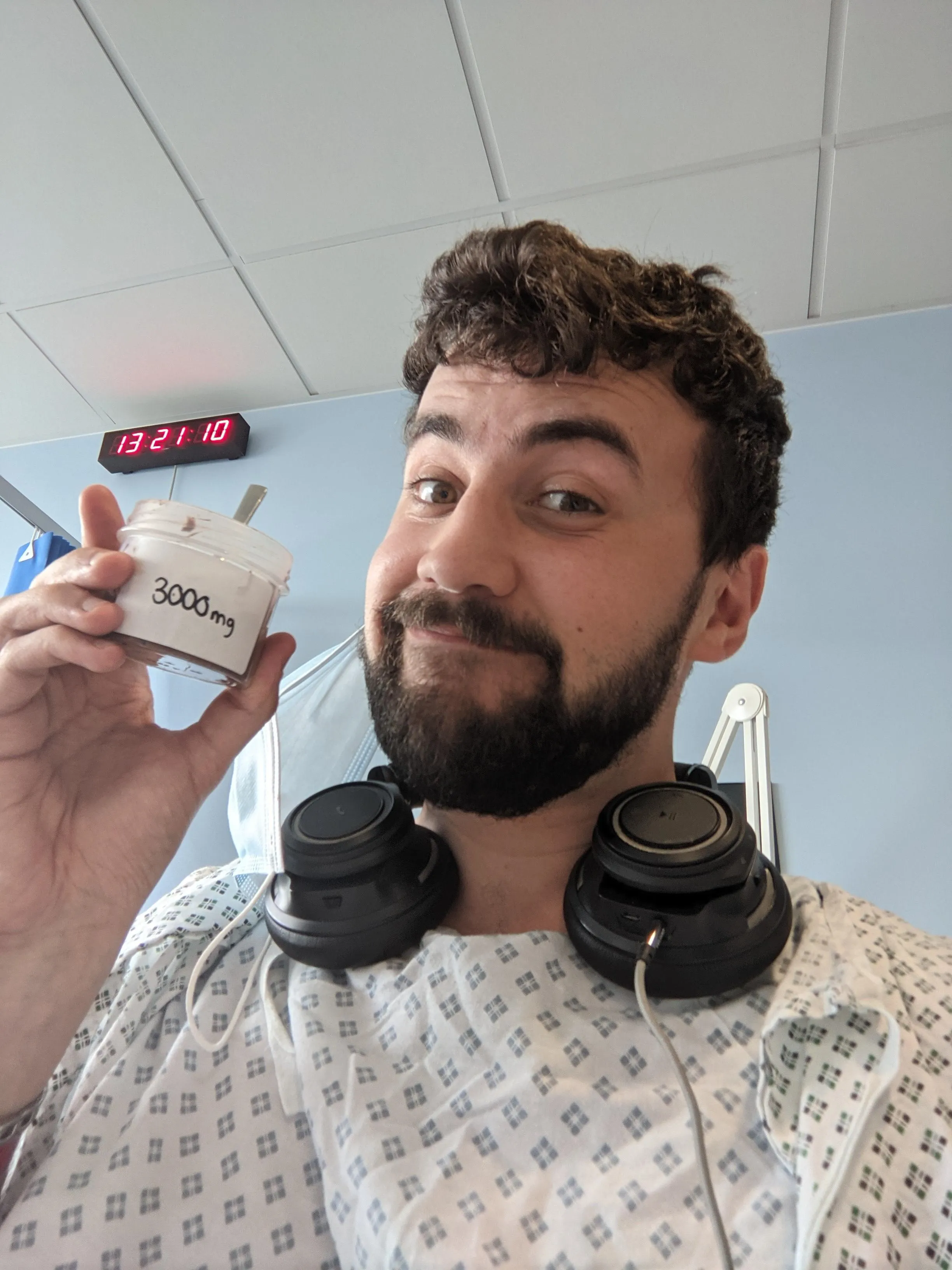I’m so proud to have been part of this trial and so happy to say that I used to be allergic to peanuts but thanks to this trial, this is no longer a concern. Me and my family were always anxious that even a trace of peanut could be life-threatening.
Chris Brookes-Smith
24 April 2025
Daily doses of peanuts tackle allergic reactions in adults
The first clinical trial to test whether adults allergic to peanuts can be desensitised has shown great success with two thirds of the cohort consuming the equivalent of four peanuts without reacting.

The Grown Up Peanut Immunotherapy (GUPI) trial is the first study entirely in adults with severe allergy to test whether daily doses of peanuts taken under strict supervision can be safely tolerated.
The approach, known as oral immunotherapy, has seen success in trials in infants and children worldwide. The findings of the first trial in an exclusive adult cohort has been published today in the journal Allergy by a research team from King’s College London and Guy’s and St Thomas’ NHS Foundation Trust. The study is funded by the National Institute for Health and Care Research (NIHR) Research for Patient Benefit Programme.
Chief Investigator Professor Stephen Till, Professor of Allergy in the School of Immunology & Microbial Sciences, said: “Constant fear of life-threatening reactions place a huge burden on people with peanut allergy. The only way to manage a peanut allergy is strict avoidance and treatment of allergic reactions, including with adrenaline. Although peanut immunotherapy is known to be effective in children, this trial provides preliminary evidence that adults can also be desensitised and that this improves quality of life. The average tolerated dose of peanuts increased 100-fold over the course of the trial.”
The Phase II trial recruited twenty-one adults between 18 and 40 with a clinical diagnosis of peanut allergy at Guy’s and St Thomas’ NHS Foundation Trust. Allergy was confirmed via skin prick test, blood test and then an oral food challenge.
In a clinical setting, participants received the first dose of 0.8mg peanut flour mixed in with food, then 1.5 mg 30 minutes later followed by 3mg a further 30 minutes later.
Participants who tolerated 1.5mg or 3mg of peanut flour continued on a daily dose at home for 2 weeks. This is the equivalent of 0.5-1% of a whole peanut.

Then participants returned at 2-weekly intervals for supervised doses of more peanut protein, increasing from 6mg (around 1/40th of a whole peanut) to 1g (four whole peanuts). If participants could tolerate 50-100mg of peanut protein, participants were switched to eating whole peanuts, peanut butter or peanut products, with the first dose being under supervision of the clinical team.
Once participants achieved a daily dose of 1g they remained on this dose for at least four weeks before undergoing a double‐blind placebo‐controlled food challenge. This involved being given increasing doses of either peanut or placebo (dummy) on separate days under close supervision to test their tolerance. Participants then continued daily dosing for at least three months before exiting the trial as well as the option of continuing post-study.
Results showed that 67% of participants were able to consume at least 1.4g peanut protein – the equivalent of five peanuts – without reacting. Participants of the trial then could consume peanuts every day at home to remain desensitised.
Professor Till said: “We are very pleased with the results. The efficacy rate is broadly in line with peanut oral immunotherapy trials in children. The next stage of the research will be confirming this in larger trials, and also identifying the group of adult patients who would most likely benefit from oral immunotherapy, and see whether it can lead to long-term tolerance in this age group.”
Lead author specialist Allergy Dietitian Hannah Hunter from Guy’s and St Thomas’ NHS Foundation Trust said: “Living with peanut allergy is a huge burden due to the need for constant vigilance and the risk of accidental exposures. Everyday situations such as eating in restaurants and social events are anxiety provoking and our patients tell us that the condition also affects travel choices and career options. We found that quality of life significantly improved after oral immunotherapy and fear of food also decreased. Many participants who completed the trial told us that the treatment had been life-changing and they were no longer living in fear.”
Chris Brookes-Smith, a 28 year old Cybersecurity Specialist from Northamptonshire, took part in the trial. He was diagnosed with a peanut allergy as a baby and jumped at the chance of taking part in the trial.
He added: "The trial was an interesting experience because all of my life I had associated the taste and smell of peanuts with fear and death. I started with a small amount of peanut flour with yoghurt and by the end of the trial I could eat four peanuts in one sitting. Now, I have four peanuts every day with my breakfast to maintain my immunity. Before, a tiny mistake could have life-threatening impacts but now I don’t have the fear that I might collapse and die from eating a takeaway.”
Public Health Minister, Ashley Dalton said: “This groundbreaking research offers hope to thousands living with peanut allergies. For too long, people have navigated daily life in fear of accidental exposure that could be life-threatening.
"I'm proud the UK is leading this vital work through NIHR funding. These results show how we're transforming lives through science, potentially changing care standards for adults with peanut allergies worldwide."
Professor Lucy Chappell, Chief Scientific Adviser at the Department of Health and Social Care (DHSC) and Chief Executive Officer of the NIHR said: 'These results mark an important milestone in allergy treatment and offers new hope to adults living with peanut allergies. The NIHR Research for Patient Benefit Programme funds research that has a direct impact on improving patient outcomes. For adults who have long lived with the daily burden and fear of accidental exposure they may have a pathway toward greater safety and an improved quality of life.'

